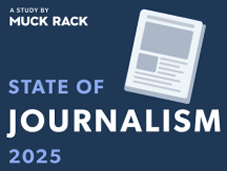Advertisement
|
Journalists Cite Disinfo, AI, and Platform Shifts in 2025
| RADIO ONLINE | Wednesday, June 18, 2025 | 2:39pm CT |





|
 |
A new survey of more than 1,500 journalists reveals a profession at a crossroads, where misinformation, evolving technology, and changing audience habits are reshaping how news is reported, promoted, and sustained. The 2025 State of Journalism study, released by Muck Rack, highlights disinformation as the single most serious threat to the future of journalism, cited by 36% of respondents. This concern edges out issues like declining public trust (28%), lack of funding (28%), and political polarization (25%).
Despite challenges, most journalists -- 67% -- say their work still feels meaningful, even as nearly half describe it as "exhausting." More than half (54%) remain confident in their long-term career prospects, though 62% say their job responsibilities have expanded over the past year.
AI Tools Now Mainstream in Newsrooms
In a sign of rapid technological adoption, 77% of journalists report using AI tools in their work. ChatGPT is the most widely used, with 42% of respondents saying they've utilized it in the past year. Other popular tools include transcription services (40%) and writing assistants like Grammarly (35%).
Despite their growing reliance on AI, only 18% of journalists say unregulated AI is a top concern -- ranking far below misinformation and funding worries.
Social Media: Promotion Still Key, But Platforms Shift
Social media remains a powerful tool for promotion, with 45% of journalists calling it "very important" for sharing their work. However, only 23% say it's equally important for producing journalism, down from 33% last year.
For the first time, Facebook is viewed as the most valuable platform by journalists (27%), surpassing X (formerly Twitter), which dropped sharply to 21% from 36% in 2024. LinkedIn is now the most trusted social media platform among journalists, with 60% rating it as trustworthy.
More than half of journalists (58%) also say concerns about safety, harassment, or reputation have affected how they use social media professionally.
The PR-Journalist Relationship
Public relations remains a significant source of news, with 84% of journalists saying at least some of their stories originate from PR pitches. However, relevance remains key: 86% say they'll immediately delete a pitch that doesn't match their beat.
Journalists favor pitches that offer access to sources (62%), original data (66%), and are brief and to the point -- preferably under 200 words and sent before noon. Only 3% say they always receive relevant pitches, and more than half say they seldom or never respond to PR outreach.
Independent Publishing and Income Realities
Roughly one-third (34%) of journalists now publish independently under their own name or brand, and 61% of those earn at least some income from it. Still, most full-time journalists earn between $40,000 and $70,000 annually, and 40% report earning above $70,000.
Outlook: Cautiously Optimistic
The findings paint a complex picture of a profession undergoing transformation. While journalists remain deeply committed to their mission, they face ongoing pressures from shrinking newsrooms, shifting platforms, and the rise of misinformation. Yet, as the report notes, many are adapting -- through new tools, alternative revenue, and cautious optimism for the future.
The survey was conducted by Muck Rack from April 4 to April 30, 2025, and includes responses from over 1,500 working journalists globally, with a majority based in North America.
Advertisement
|
Latest Radio Stories
CPB to Wind Down Operations Following Rescissions Bill
|
iHeartMedia Launches ''105.3 The Breeze'' in Norfolk
|
Edison Research Reveals Top 50 U.S. Podcasts for Q2
|
Advertisement
|
Public Radio Music Stations Face Uncertainty Over MLC
|
Radio Newsrooms Grow for Second Year, Local News Surges
|
Greg Papa Reveals Cancer Diagnosis, Steps Away from KNBR
|

















